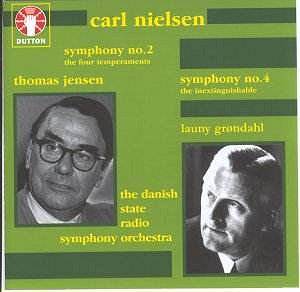These performances are not merely vivacious they are
eruptively ferocious as if the Danish countryside was volcanically riven.
Both Jensen and Grøndahl bring similar qualities to the performances.
If a sense of danger and the unpredictable is missing from most studio
performances this is not true of the present coupling. This quality
of being on the edge of something uncontrollable or even of being swept
into the uncontrollable is immanent. The Second Symphony (dedicated
to Busoni) is contemporaneous with Scriabin 2, Melartin 1, Magnard 4,
Glazunov 7 and Elgar’s Falstaff. It is a character portrait of
the Four Temperaments: Choleric, Phlegmatic, Melancholic and Sanguine.
In the Choleric Jensen leaves us in no doubt of the possessed
fury of this music. The Melancholic I have never heard paced
as well nor as grief-stricken - the superior in its expression of sorrow
to so many ceremonial pieces. The optimistic and unstoppable confidence
of the last movement struts and celebrates yet avoids arrogance.
The Fourth Symphony’s unruly buffeting is relieved
by a pastoral allegretto and a poco adagio uncannily close
in bitter intensity to a Shostakovich adagio. The ‘Life Force’ that
shakes and cleaves this symphony’s outer movements is the same force
that grips (albeit in more romantically Tchaikovskian ecstasy) Louis
Glass’s Fifth Symphony of three years later. Grøndahl (1886-1960),
a very fine composer in his own right, staggered Edinburgh Festival
performances with this work in 1950, paving the way, with Jensen and
Tuxen, for the Nielsen revival of the 1950s. This awakening was aided
by the advocacy of major critical voices such as Robert Simpson and
Robert Layton - the latter’s notes adding valuably to this release.
I have not heard the Blomstedt Decca set nor the Bryden
Thomson on Chandos however the Blomstedt is well thought of and in fine
sound. Still and all, these two historic performances have the power
to shake you from complacency. Much more than a mere historical experience.
Rob Barnett

![]() Danish State Radio SO/Thomas
Jensen
Danish State Radio SO/Thomas
Jensen ![]() DUTTON LABORATORIES
CDCLP4001 [68.00]
DUTTON LABORATORIES
CDCLP4001 [68.00]